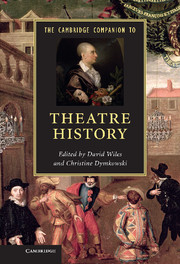Part II - When?
Published online by Cambridge University Press: 05 February 2013
Summary
When?
Theatre historians always work with a map of the past in mind. To put it less metaphorically, they write with some sense of a temporal continuum, where one phase leads to the next, linked by complex relations of cause and effect. The historian’s task is to impose order upon the chaos of events that were once lived and experienced by a multiplicity of confused human beings, and, though hindsight brings undoubted benefits, there is always something arbitrary about the retrospective imposition of order. Historians are interested in moments or processes of change, because only by identifying change can they map continuities, but they differ radically in the kinds of changes that they think significant. Their priorities stem from different aesthetic tastes and different ethical priorities regarding the world they themselves inhabit.
In this section we shall look at how theatre historians within the European or Western tradition have mapped the past. The story that we shall explore in the next four chapters belongs to an intellectually and politically dominant tradition. This narrative seeks to track the journey that brought us to where we are now, and, for all its many byways and detours, it comprises a single story that countless historians of theatre have each tried to retell in their own way. It is a story that always needs to be challenged, and creative historiography necessarily involves questioning received versions in the light of new understandings or intuitions about the present. Historians never work on a blank slate. It is impossible to look at the past objectively as a set of unmediated events because past events always come to us packaged up as stories, and sources are always shaped and ordered by someone. Just as the Greek tragedians kept telling the same old stories of Oedipus or Orestes in new ways for new purposes, so historians keep reshaping old stories in order to accomplish their own intellectually creative work. It is necessary to see how historians have previously configured the past in order to configure it afresh.
- Type
- Chapter
- Information
- The Cambridge Companion to Theatre History , pp. 7 - 14Publisher: Cambridge University PressPrint publication year: 2012

